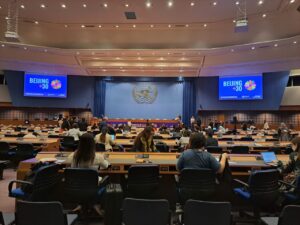At the Asia-Pacific Ministerial Conference on the Beijing+30 Review, inaugurated in Bangkok. Pakistan committed to advancing digital access, improving economic opportunities for women, and implementing gender-responsive budgeting.
Pakistan Pledges Enhanced Digital Access and Economic Opportunities for Women at Beijing+30 Review Conference
Specail Report (Imrana Komal
The delegation from Pakistan, led by Advisor on Law and Justice Barister Aqeel Malik, reaffirmed the nation’s dedication to gender equality during the presentation of its country statement.
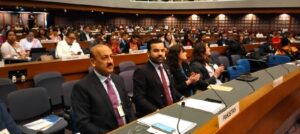 Malik emphasized Pakistan’s commitment to the Beijing Declaration and Platform for Action, celebrating progress in women’s empowerment while acknowledging that achieving true gender equality remains a work in progress.
Malik emphasized Pakistan’s commitment to the Beijing Declaration and Platform for Action, celebrating progress in women’s empowerment while acknowledging that achieving true gender equality remains a work in progress.
Malik highlighted that Pakistan’s Constitution, particularly Articles 25, 26, 27, and 34, provides a solid foundation for gender equality by prohibiting gender-based discrimination. These principles underpin the National Gender Policy Framework 2022 and Vision 2025, which prioritize women’s roles in governance, economic development, education, and security.
The country has launched several initiatives to empower women across economic, social, and legal domains:
Economic Empowerment: The Prime Minister’s Initiative for Women Empowerment provides interest-free loans, skills training, and daycare centers for working women. Projects like the Women’s Pink Bus Service and Women on Wheels aim to improve mobility and economic participation.
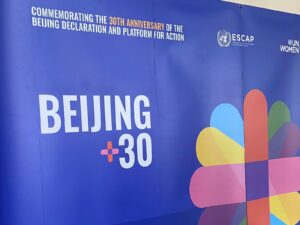
The National Financial Inclusion Strategy 2023 has exceeded its target of 20 million active bank accounts for women, supported by policies like Banking on Equality and the Revolving Financing Facility for Women Entrepreneurs.
The Benazir Income Support Program allocated Rs. 200 billion for women’s welfare initiatives.
Malik emphasized Pakistan’s efforts to increase women’s representation in politics and the judiciary.
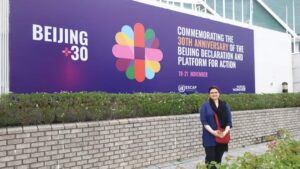 Reserved seats for women in Parliament and the historic appointments of Justice Ayesha Malik and Justice Musarat Hilali to the Supreme Court underscore these efforts. Approximately 19% of district judges in Pakistan are women, with 565 serving in district judiciary roles.
Reserved seats for women in Parliament and the historic appointments of Justice Ayesha Malik and Justice Musarat Hilali to the Supreme Court underscore these efforts. Approximately 19% of district judges in Pakistan are women, with 565 serving in district judiciary roles.
Internationally, Pakistan is a leader in women’s participation in peacekeeping missions, with female peacekeepers constituting 19.1% of its contingent, surpassing the UN’s 15% target. Domestically, Pakistan has developed comprehensive frameworks to combat violence against women.

The conference, jointly organized by the United Nations Economic and Social Commission for Asia and the Pacific (ESCAP) and UN Women, brought together over 1,200 delegates to evaluate progress since the 1995 Beijing Declaration. ESCAP Executive Secretary Armida Salsiah Alisjahbana underscored the need for women to lead in addressing climate change and digital transformation.
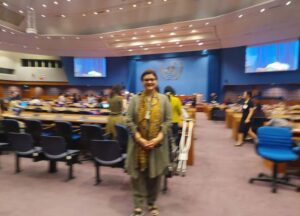
A new report, Charting New Paths for Gender Equality and Empowerment: Asia Pacific Regional Report on Beijing+30 Review, was also launched at the event. It outlined challenges and forward-looking strategies, emphasizing actions such as transforming gender norms, improving gender data collection, and fostering cross-sectoral partnerships.
Sima Bahous, Executive Director of UN Women, urged participants to recommit to the Beijing Platform for Action, stating: “Bold actions are needed to address current challenges and pave the way for future generations to thrive.
The conference, held ahead of the 30th anniversary of the Beijing Declaration, served as a vital platform to drive renewed efforts toward achieving gender equality in the Asia-Pfacific region.


